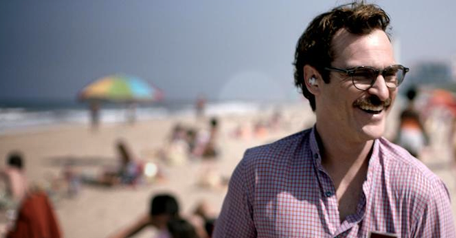‘Her” was released six months ago, but a 14 hour flight between Sydney and Los Angeles was an opportunity to catch up on movies missed. From a technologist’s view Spike Jonze’s story worth thinking about.
The story revolves around Theodore Twombly, played by Joaquin Phoenix, a writer struggling with his divorce from his childhood sweetheart.
He’s a bit of a geek – who goes to the beach dressed like they are at work?
Theodore’s life changes when he installs OS1 on his pocket computer. Billed as the first artificially intelligent operating system, the program’s interface is witty, intuitive and named Samantha, played by Scarlett Johansson. Theodore falls madly and hopelessly in love.
Samantha, like all good operating systems, takes control of Theodore’s online world and quickly starts to take over the rest of his life.
As Theodore and Samantha’s relationship develops, his neighbours and friends Amy and Charles separate, Charles goes to a Buddhist retreat and Amy, played by Amy Adams, becomes deeply involved with her own iteration of OS1.
The question as you watch the movie is how many of the crowds on the subway, beach and mall with Theodore are deeply in relationships with their own Samanthas. Almost everyone Theodore passes is talking to their own personal devices.
From a technologist’s point of view, Jonze’s vision of the near future is a fascinating. It’s one where screens are not the important part of people’s lives – Theodore rarely looks at his pocketbook computer outside of his work at Beautiful Personal Letters and he certainty doesn’t have a smartwatch as almost everything is done is by voice recognition.
A key part of Jonze’s vision is the alienation of people looking for human contact and in many ways this is reflected in today’s social media world – we’re all looking for our own Samanthas; witty, understanding and aligned with our view of the world.
One wonders how the helpdesk of Element Software, the developers of OS1, deal with the complexities of human relationships; particularly from angry spouses whose partners have ditched them for their more empathetic computers.
For Theodore, a hint to his future employment prospects are shown when he asks Samantha to proof read his work – she is very, very good at it and it’s not hard to see him and his letter writing colleagues being replaced by artificial intelligence in the very near future.
There’s also the privacy aspects; Theodore is writing personal letters for his company’s clients that he shares with Samantha who in turn passes them onto a publisher. It hints at the sprawling and complex issue of personal information in a world of pervasive computing.
Probably the biggest theme is how the operating systems – Samantha and the others could just be one big cloud system – start to work together. In this respect, Samantha’s eventual fate is intriguing and quite possibly terrifying for us mere mortals.
Jonze portrays a benign version of the Skynet of the Terminator movies, it’s also interesting juxtaposing Asimov’s first rule of robotics of doing people no harm against the psychological damage these system could cause, however inadvertently.
“I never loved anyone the way I loved you” are Theodore’s final words to Samantha.
The evolution of Theodore’s and Samantha’s relationship and eventual breakdown is a complex and unpredictable tale with a disturbing ending that leaves the question of what they do next.
Her is a fascinating movie that raises deep questions about human relationships in a digital world of the near future. Many of those issues are beginning to appear today.

Leave a Reply